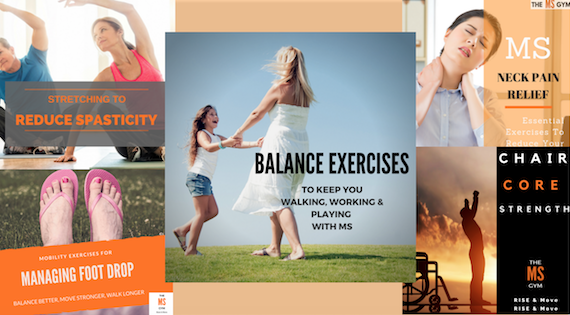By YULIA STESHENKO
( if reading on MOBILE device , click on the title to read the entire article)
Fellow MS Gymmer Tracy P. posted something in the Members Only Community which has stayed with me. She wrote, “My favorite thing about the MOC is that I am just Tracy. Not Tracy with MS. Thank you for just letting me be me!”
And I knew exactly what she meant. I have never felt freer to be myself than I do in the MS Gym community. And I don’t take this for granted.
I used to think I didn’t need to know others with physical challenges, much less immerse myself in a community of others with MS. I knew MS all too well on my own, having gotten my first major episode at fourteen, a full 23 years ago.
Back in college, I even shared with a magazine on diversity that I had no interest in joining a group for students with disabilities, as the point of college was to meet people different from myself. Yes, this is on record somewhere.
I thought, what could I learn from others about the humiliation of my body’s limitations or the frustration of fatigue or the sorrow of being left out. These experiences took up too much of my life already. Wasn’t college about expanding our world view and connecting with those who are different from us?
Reinforcing my view was my experience in support groups for those with MS, first at a local hospital and then through the MS Society, where I joined a conference call once a week for those homebound with MS. I remember more than anything the trauma of these experiences.
A woman spoke of how she had to leave her job as a college professor because her mind no longer worked as well as it once had. (I had wanted to pursue academia, so her story spoke to the limits of my own dreams.)
The moderator of an MS support group for those who were homebound compared my living situation in my 20s to a group home because my partner at the time also struggled with a chronic condition. (I’d thought it was a relationship all those years. Who knew?)
And a husband spoke for his wife, who has MS, as if she could not speak for herself about her experiences, though she was there beside him. (I never did hear her voice in all the sessions I attended.)
I thought, I don’t need this in my life. We were all in a sinking ship together and it didn’t make me feel less alone. If anything, it made me feel claustrophobic.
I needed people who brought out the best in me, who made me feel I am not my diagnosis. So it took me years to understand I could find this in a group made up of others with MS and other neurological conditions. It took me years to embrace my identity as someone with a disability because I lived in fear it would consume my entire sense of self.
Yet, as Tracy suggested in her post, a weird thing happens when you find a community who understands what you are going through: You learn you can be yourself. You learn you are enough as you are and that MS does not define you. You learn you needn’t feel alone or be ashamed of your experiences. You learn a diagnosis is not the end of your story. You learn to test your assumptions of what you are capable of. You see you have a choice in how to live your life.
One of the great joys of the MOC is how it has enabled us to give voice to our experiences and find our voices as individuals. Above all, I think of it as a storytelling group. I love learning others’ stories, both their experiences with MS and their experiences unrelated to this. To see a person shed the veil of their diagnosis and share their quirks and passions, whether it is painting or music or cooking or being a parent, whether they approach life as a poet, humorist or scientist running studies on themselves and reporting the outcomes.
I received a card earlier this month from my dear friend Ashley, in which she wrote:
‘Today you are You,
that is truer than true!
There is no one alive who is You-er than You!’
Dr. Seuss joins me in wishing you your you-est year yet!
With much love, Me
May you become more YOU in the year ahead, whatever that entails. May you discover who you are with MS and beyond MS.
If I may go from one children’s author to another, I leave you with this question posed by Lewis Carroll’s hookah-smoking Caterpillar to Alice: “Who are you?”
